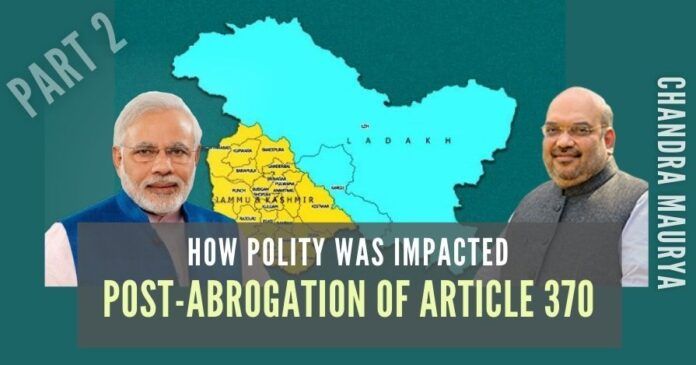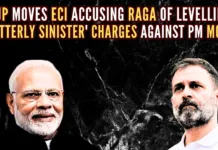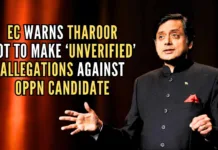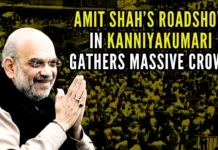
The previous part of the article can be accessed here. This is part 2.
The popularity of ‘power-hungry’ leaders on the decline due to rising ‘trust deficit’
Ahead of the Abrogation of Article 370 and reorganization of the erstwhile state of Jammu and Kashmir into two Union territories leaders of all the mainstream political parties, buried their own political differences, before arriving at the Gupkar road residence of Dr. Farooq Abdullah in Srinagar on August 4, 2019.
Soon after the meeting ended Dr. Abdullah was authorized to read out the text of the resolution which was passed during the meeting.
The crucial meeting was attended by arch-rivals which included Peoples Democratic Party (PDP) stalwart Muzaffar Hussain Baig, PDP Chief Mehbooba Mufti, former Chief Minister Omar Abdullah, senior National Conference (NC) leaders and party MP’s Mohd Akbar Lone, Justice (Retd) Hasnain Masoodi, Mohd Ali Sagar and Congress was represented by former Cabinet Minister Taj Mohi-ud-Din, Sajjad Lone and Imran Raza Ansari of Peoples Conference, Shah Faesal Chairman of Peoples’ United Front, Muzaffar Ahmad Shah, President of Awami National Conference.
The meeting was convened to project a united face of the Kashmiri politicians and scuttle any deliberate move by the BJP led Union government to alter the political destiny of the state of Jammu and Kashmir.
Soon after the meeting ended Dr. Abdullah was authorized to read out the text of the resolution which was passed during the meeting. The resolution clearly stated, “Modification, abrogation of Article 35-A, 370, delimitation or trifurcation of the State would be an aggression against the people of Jammu, Kashmir, and Ladakh.”
Even at that juncture, no one present in the meeting had any inkling what was coming their way. Earlier, in the meeting, the political leaders had expressed serious concerns over certain government orders indicating some big decision was in the pipeline.
Even Congress party Vice President Rahul Gandhi was prevented from stepping out of the Srinagar airport on August 24.
Around midnight, as telephone networks were switched off and even landline connections were put on hold, the state agencies swooped down on the residences of almost all the mainstream political leaders and detained them before shifting them to different locations. Three former Chief Ministers were also detained at three different locations. Due to his old age and medical condition, Dr. Abdullah was detained in his own home while Omar and Mehbooba Mufti were shifted to different locations.
For several months the political activity in the Kashmir valley came to a standstill and no political leader worth his/her name was allowed any access to the media. There was complete silence. Even separatist leaders remained mute spectators and shied away from provoking a situation.
Talking about the two principal opposition parties, their credibility came under the scanner as nowhere in Kashmir valley any mass uprising was witnessed on ground zero in support of the release of their top brass from the detention.
Few sympathizers and junior party workers cried foul on various social media platforms from outside the Kashmir valley but in vain. In the absence of communication facilities, no one outside Kashmir valley could track down the whereabouts and footprints of these leaders. They remained incommunicado for several months. Even central leaders from different political parties tried to visit Kashmir valley and demanded the release of political prisoners from different jails but the central government paid no heed to their passionate pleas.
Even Congress party Vice President Rahul Gandhi was prevented from stepping out of the Srinagar airport on August 24. He was later sent back to New Delhi without allowing him to meet detained political leaders.
The next day another significant development took place.
On August 25, the J&K flag that fluttered atop the Civil Secretariat complex alongside the national flag in Srinagar was taken off after the abrogation of Article 370. This went away the last sign of Article 370 which granted special status to the State of Jammu & Kashmir. Before the abrogation of Article 370, the J&K State was permitted to fly its own flag along with the National flag under Article 370. The State flag was adopted by the Constituent Assembly of J&K on June 7, 1952.
As normal life started picking pace the peace-loving population across the Kashmir valley heaved a sigh of relief. Though business establishments remained closed in several urban centers the normal life went on smoothly in rural pockets without bringing much difference in their lifestyles.
J&K APNI party launched by Syed Altaf Bukhari
After a few more months, the ice was broken when a ragtag coalition of former colleagues belonging to different political parties became the founding members of a new political party, named as Jammu and Kashmir’s Apni party (JKAP). Syed Altaf Bukhari, who remained a cabinet minister in BJP-PDP alliance govt became the founding president of the party.
The formation of the Apni Party was the first major political initiative in Kashmir since the abrogation of Article 370. The move was aimed at filling the political vacuum created by the removal and detention of political leaders, especially former chief ministers Farooq Abdullah, Omar Abdullah, and Mehbooba Mufti.
“As a political party, it is but natural that we will keep the people informed about what we are doing to get justice. We are very clear that we do not accept the changes forced on us and will continue to oppose them,” said the veteran leader.
The Apni Party comprises former MLAs from PDP and Congress such as Mohmad Dilawar Mir, Javid Baig, Shoaib Lone, Ajaz Ahmed Khan, Rafi Ahmed Mir, Usman Majeed, and Vikram Malhotra. Former chief secretary Vijay Bakaya, Ghulam Hassan Mir, and others were present at the launching ceremony.
Soon after the launch, Bukhari told reporters in Srinagar, “We want to end the mistrust between Srinagar and New Delhi. We are at a stage where Kashmir and Jammu both demand statehood and domicile rights for its citizens.” Bukhari said issues like self-rule and autonomy, which are demands of the PDP and National Conference (NC) for Jammu and Kashmir respectively, were not in the Apni Party’s agenda. Asked what was Apani Party’s stand about the revocation of Article 370, the former finance minister said the matter was pending before the Supreme Court. “If I don’t accept the abrogation of Article 370, will the decision change? We must wait for the Supreme Court’s decision,” he emphasized.
Dr. Farooq Abdullah released on March 13, Omar on March 24
After a gap of 221 days, sitting Parliamentarian and National Conference President Dr. Farooq Abdullah was set free after his PSA was revoked. Instead of making a political speech he played safe and demanded release of all political leaders from the detention. When quizzed by the media, Dr. Abdullah said he will not speak on the political matter until other leaders are released.
After a gap of 10 days, On March 24, Omar Abdullah too was released from the detention. But he too chose to remain mum. After his release, Abdullah said he would speak about political matters later, as the first challenge was to fight the Covid-19 pandemic. He said, “During my period of detention, I thought a lot about what I would say the moment I come out what I would say about what happened on August 5 last year.”
Farooq raises demand for restoration of statehood
As the revocation of Jammu and Kashmir’s special status is set to complete one year on August 5, former Chief Minister Farooq Abdullah on Sunday called for the restoration of its statehood and hoped the Supreme Court would render justice by striking down the repeal of Article 370 provisions.
In his first media interview after the abrogation of Article 370 of the Constitution that ended the erstwhile state’s special status, Abdullah said that his party would continue to contest the changes through all democratic means. These changes were a “betrayal” of the trust reposed by the people of Jammu and Kashmir when the State acceded to the Union of India, he said.
The National Conference (NC) has mounted a legal challenge in the Supreme Court to the abrogation of Article 370 and carving out of two union territories of Jammu and Kashmir, and Ladakh from the erstwhile state. The legislation passed by Parliament and the subsequent orders issued by the President was “unconstitutional”, it was submitted in the apex court which has set up a five-member bench to hear the matter.
“As a political party, it is but natural that we will keep the people informed about what we are doing to get justice. We are very clear that we do not accept the changes forced on us and will continue to oppose them,” said the veteran leader.
Omar announces poll boycott, will not contest polls till J&K remains a UT
Meanwhile, his son Omar Abdullah has also set the ball rolling by sending a tough message to New Delhi that he won’t participate in the Assembly polls as long as J&K remains a Union Territory.
Now it remains to be seen whether the Centre would allow these Kashmiri politicians to dictate the agenda or successfully implement its own reform agenda to trigger growth in the region.
To be continued…
Note:
1. The views expressed here are those of the author and do not necessarily represent or reflect the views of PGurus.
- Assembly polls in Jammu and Kashmir soon: Modi - April 12, 2024
- Campaign trail: Udhampur-Doda Lok Sabha seat - April 8, 2024
- Ghulam Nabi Azad returns to the poll arena, to contest the Anantnag-Rajouri Lok Sabha seat - April 2, 2024











[…] previous part 1 and part 2 of the article can be accessed here. This is part […]
Did you see that Omar Abdulla says he won’t contest elections in K&J till it is a UT? How many votes will he get if he did?